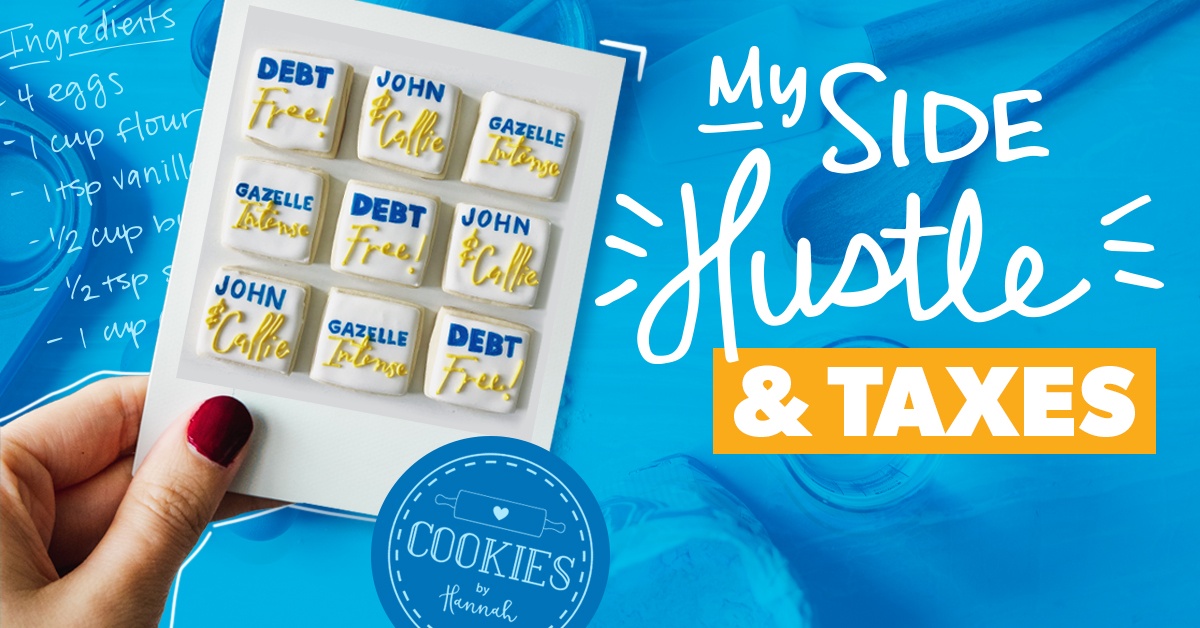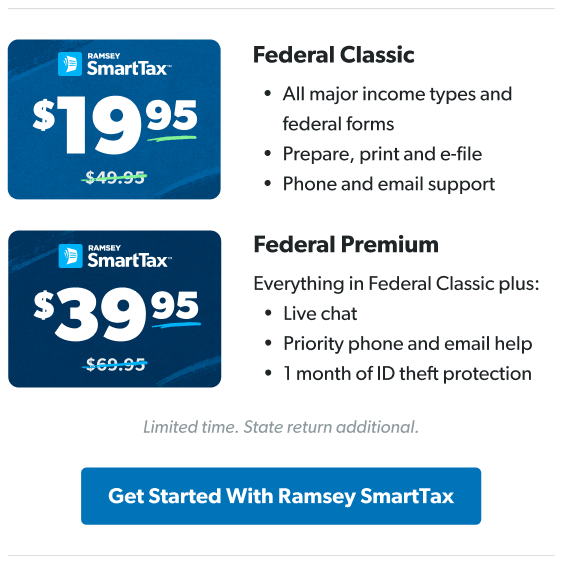Key Takeaways
- If you earn income from a side hustle, you’re responsible for reporting it and paying taxes on it—just like any other income.
- You’ll need to pay both income taxes and self-employment taxes, and you may be required to make quarterly estimated payments.
- Keep track of all expenses, and set aside 20–35% of your earnings so you’ll be prepared to file taxes accurately.
We see you, side hustler. We see you out there delivering pizzas five nights a week. We see you driving folks to and from the airport on the weekends. We see you editing photos from your cousin’s friend’s wedding at 3 a.m.
Get expert money advice to reach your money goals faster!
Maybe you’re taking on a side hustle (or two) to speed up your debt snowball or maybe you just love spending your free time baking cookies or designing websites. Either way, who doesn’t like the idea of bringing in some extra cash?
But listen up: If you’re not careful, all that side hustle money could cause some serious trouble once tax season rolls around. All it takes is one big job or a few new clients to jack up your tax bill in a major way. Here are three ways your side gig could mess up your taxes:
- Depending on how hard you’ve hustled in the last year, you could see your tax bill increase by hundreds (or maybe thousands) of dollars.
- If your side hustle is successful enough, you might have to pay estimated taxes throughout the year—and the IRS will whack you with a penalty if you don’t pay those on time.
- And what if the IRS decides they want proof that you actually spent $1,000 in cooking supplies as a business expense? Do you have the receipts or bank statements to prove that’s what you actually spent?
This is a lot to think about, but you have to be prepared for all of it! Here are some ways you can keep your side hustle from messing up your taxes:
1. Set aside 20–35% of your side hustle income for taxes.
Take a look at the last paycheck from your “day job.” You’ll see that your employer holds back some of your salary to pay for income taxes before the money ever hits your bank account—that’s called federal income tax withholding.
But that money you earned from pet sitting your neighbor’s dog? Your neighbor and Fluffy over there don’t withhold taxes from what they paid you. That means it’s on you to report the income you make from your side hustle and make sure you pay the taxes you owe.
No matter how much or how little you make, open up a separate savings account and stash 20–35% of all your side hustle money for taxes. That way, you’ll have enough money to pay for the income taxes and the self-employment taxes you owe on that income. Do that, and you won’t get caught off guard by a massive tax bill once tax season rolls around!
2. Find out if you need to pay estimated taxes.
Our tax system is a “pay-as-you-go” system. That means the IRS wants folks to pay their taxes throughout the year, not just in one lump sum. That’s why you might have to pay estimated taxes (or quarterly taxes), which are paid on a quarterly basis throughout the year, on the money you make from your side hustle.
If your side gig only brings in a few hundred bucks each year, you can relax. You probably don’t need to worry about estimated taxes. Just keep track of what you’re earning and file your tax return in the spring like you normally would and then pay whatever you owe in taxes on that extra money.
Generally, you’ll pay estimated taxes if you expect to owe more than $1,000 in taxes when you file your tax return.1 That’s after subtracting your federal income tax withholding from the total tax you expect to owe this year.
If you find out you need to pay estimated taxes, you have two options:
- Option 1: Divide the total tax you expect to owe when you file your tax return into four equal payments and pay the estimated taxes when they’re due.
- Option 2: Adjust your tax withholding at your normal job by filling out a new W-4 form to account for the taxes you’ll owe on your side hustle income. The IRS has a new tax withholding estimator that makes it easy to figure out how much you need to adjust your withholding.
Your side gig could make your tax situation pretty tricky, so it might be a good idea to get in touch with a tax advisor who can help you figure out whether or not you need to pay estimated taxes.
3. Open a separate checking account for side hustle expenses.
It’s time to start treating your side gig like a business, because it is a business! And just like any other small business, you can write off some of your side hustle expenses from your taxable income. That’s a big deal because those write-offs can help you lower your tax bill!
But trying to sort through what’s personal and what’s business on your bank statements can be more frustrating than trying to pick off all the unwanted toppings on your favorite pizza (get out of here, pineapple).
That’s why you should open a checking account dedicated solely to expenses related to your side hustle (in addition to that savings account for taxes we just talked about). It’ll make it so much easier for you to find business expenses and add up how much you spent on your side gig throughout the year. It’s a really good idea!
4. Create a simple record-keeping system.
Unless you want to spend hours each tax season sifting through a year’s worth of receipts trying to separate personal expenses from business ones, this is one step you don’t want to skip.
You can go old school and use labeled manila folders or go with a digital record-keeping system that keeps all your files in the “cloud.” Choose whatever works best for you!
What does this have to do with taxes? For one thing, having all your receipts from side hustle-related expenses in one easily accessible place will help you figure out how much you can claim in business-related deductions (instead of coming up with a number out of thin air). And second, if the Tax Man ever comes knocking and asks you to verify those expenses, you have the paper trail to prove it.
Here are a few important documents and information you might want to keep in your new record-keeping system:
- Receipts
- Bank statements
- Business records
- Tax forms
- Car mileage and car expenses
5. Get help from a tax professional.
In case you haven’t figured it out by now, having a side hustle will make your taxes a bit more complicated than you’re probably used to. And trying to get a handle on all the tax stuff that comes with it can be a little overwhelming.
That’s why we recommend working with a reliable tax advisor you can turn to for advice and tax guidance. Our RamseyTrusted tax advisors can sit down with you, answer all your tax questions, and help you understand how your side hustle will impact your tax situation so you can file with confidence. That way you can focus more on doing what you love. That’s a win-win for everyone!
Find a tax pro in your area today!
If your taxes are pretty straightforward and you want an easy-to-use tax software that can give you some peace of mind, check out Ramsey SmartTax. No hidden fees, no advertisements, no games. That’s how it should be!




